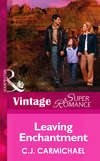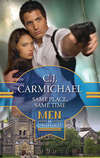Czytaj książkę: «Her Better Half»
Praise for the writing of author C.J. Carmichael
“A Little Secret Between Friends is a must read, full of romance, mystery and surprising revelations. Talented C.J. Carmichael has penned a wonderful book for you and all your friends. I am sure you will find a special place for it on your keeper shelf.”
—CataRomance
“From its roller-coaster beginning to its calm, smooth ending, C.J. Carmichael’s moving story highlights redefining life’s priorities and rediscovering love.”
—Romantic Times BOOKclub on Small-Town Girl
“Ms. Carmichael carefully stitches together the viewpoints of her richly drawn characters until a full-bodied patchwork quilt of their lives and love is created.”
—Romantic Times BOOKclub on The Fourth Child
“Ms. Carmichael writes powerful storylines that touch every reader’s heart, thanks to the emotional depth, rich characterizations, complex plots and appealing characters…. You really can’t go wrong when you read a book by C.J. Carmichael.”
—Diana Tidlund, Writers Unlimited, on
“Deal of a Lifetime”
C.J. Carmichael
A former chartered accountant turned fiction author, C.J. Carmichael has published twenty novels with Harlequin. Highlights include a RITA® Award nomination for her Harlequin Superromance novel, The Fourth Child (which was also a Romantic Times BOOKclub Top Pick); a romantic-suspense career achievement nomination from Romantic Times BOOKclub; and a nomination for her Harlequin Intrigue novel, Same Place, Same Time, as Romantic Times BOOKclub’s Reviewers’ Choice Best Harlequin Intrigue of 2000.
C.J. lives in Calgary, Alberta, with two teenage daughters, and a dog and a cat. Please visit her at www.cjcarmichael.com. Or send mail to the following Canadian address: #1754-246 Stewart Green S.W., Calgary, Alberta, T3H 3C8, Canada.

Her Better Half
C.J. Carmichael
Dear Reader,
While reading this book I’d like to ask you to think kindly of the semidetached, World War I-vintage, run-down, insulbrick-covered home that the heroine of this book, Lauren, shares with her next-door neighbor Erin.
Think kindly of this house, because it is modeled exactly on the first house my husband and I bought after we were married. We were living in Toronto (as are the characters in this book) and our house was on Thelma Avenue. It was the worst house in a good neighborhood. It was the worst house by quite a large margin. I still have nightmares about the basement.
But I have only good memories about the porch, where our daughter Lorelle practiced walking and climbing steps. I have good memories of the claw-footed tub we painted peach (it was the rage at the time). And I have good memories of the dining room where we enjoyed many happy meals with family and friends.
I hope you enjoy this story. I’ve been living with these characters for years…it’s hard to believe their story is finally on paper.
Sincerely,
C.J. Carmichael
This book is dedicated to my daughter Lorelle, as she takes her next big step in life to leave home and go to university.
To paraphrase Lyle Lovett, follow your heart, Lorelle—follow it with both your feet.
Big thanks to my former agent Linda Kruger, who thought this book would make a good fit with NEXT.
More big thanks for help with various research questions to Linda Prenioslo, Phil Daum and fellow Calgary RWA members Julie Rowe and Florence Cardinal.
Contents
PROLOGUE
CHAPTER 1
CHAPTER 2
CHAPTER 3
CHAPTER 4
CHAPTER 5
CHAPTER 6
CHAPTER 7
CHAPTER 8
CHAPTER 9
CHAPTER 10
CHAPTER 11
CHAPTER 12
CHAPTER 13
CHAPTER 14
CHAPTER 15
CHAPTER 16
CHAPTER 17
CHAPTER 18
CHAPTER 19
PROLOGUE
Rosedale, Toronto
O n the day my husband left me, we were in the middle of a wicked heat wave in Toronto. Inside the bedroom of our estate home, air-conditioning masked the high temperatures and humidity. I actually felt cool as I watched Gary stuff a select few of his belongings into a backpack.
I noticed that his pants were loose around his waist. He’d dropped a few pounds since he’d adopted the vegetarian diet.
That had been six months ago. It had not been my first clue that my life was going to take a dramatic and unexpected turn. There’d actually been many, but I hadn’t seen them at first. Or maybe I’d seen them but just refused to accept them for what they were: evidence that my husband was growing apart from me.
“I still think we ought to try counseling.” I was proud of how calm I sounded. I would not be one of those shrieking women who went crazy and broke things and swore they’d kill themselves, or him, if he didn’t stay.
“Counseling won’t change anything. This has been a long time coming.”
Too bad no one had told me.
But maybe I was letting myself off the hook too easily. I’d been the one to sign Gary up for the meditation course last winter. I’d seen his simmering anger, his mounting stress.
He’d been a man at the breaking point.
Until he’d found yoga. Or was it the yoga instructor? I still wasn’t sure.
“Losing my job was the best thing that could have happened to me.” He went to his sock drawer and picked through it, leaving all the fine wool dress socks behind. “It was a sign that I’m finally on the path to healing.”
Oh, for Pete’s sake! I was so sick of hearing about the “path to healing.” This path didn’t feel anything like healing to me. It felt like betrayal, and hurt and abandonment.
“Getting fired wasn’t a sign, Gary.” Who in their right mind considered losing a job a green light to desert your wife and children to go backpacking around the globe?
“How would you know, Lauren? Not to be cruel, but you’re not exactly in tune with your spiritual side.”
Despite the air-conditioning, my internal temperature jumped up a few degrees. “Oh, really?”
“You’ve never understood. Yoga isn’t about postures, or fitness, or even relaxing. It’s about spiritual growth. About achieving clarity and— Forget it. I can see you’re not listening.”
“I am listening. It’s just that I don’t happen to agree. Why can’t you study yoga and achieve enlightenment here in Canada?”
It was time for my trump card. “What about the twins?”
But even that argument didn’t move him.
“Jamie and Devin are almost grown up.”
“They’re fourteen.”
“Well, they’ve always been closer to you, anyway. They’ll be fine. They’re good kids.”
“Yes. Good kids who deserve more from their father.”
“What do you want me to do? Go out and get another job with another investment bank? Return to working twelve-hour days and six-day weeks? End up croaking from a heart attack at fifty like my old man?”
I couldn’t stand the way he was talking to me. Like he was the intelligent, rational adult while I was the mental equivalent of a temperamental toddler. He was treating me and our marriage like an encumbrance to be gotten rid of in the same way as a bothersome outstanding balance on a mortgage.
“Don’t you love me anymore?”
The question just came out. I hadn’t planned to ask it. As I stood there waiting for his answer, I found myself remembering the girls when they were little, scrambling out of the pool after a swimming lesson, wet and shivering, waiting for me to wrap them in a towel.
Now I was the vulnerable one, waiting for Gary to throw me something. If not a towel, then maybe a facecloth.
“Lauren.” He sighed. “I’ll always love you. But things are different now.”
I summoned my courage. “Is Melanie going on your backpacking trip, too?”
His mouth tightened. “This has nothing to do with Melanie.”
“So she’s not going?”
He didn’t say anything.
Damn him. The bastard.
“I have an appointment booked with my lawyer this afternoon,” I said. “Where should I have him send the papers?”
He straightened slowly. “You mean divorce papers?”
The D-word hung in the air between us. I couldn’t believe I’d found the courage to deliver the ultimatum.
Please, please, please, I found myself praying to an unknown, unimagined entity. Let Gary realize what I mean to him. What our family means to him.
But he nodded, as if a divorce had been in his plans all along. Rather than trying to talk me out of legal action, he grabbed paper and pen and wrote down an address.
Melanie’s no doubt.
Gary added one more pair of socks to the pack, then closed the flap.
“That’s it? That’s all you’re taking?”
“You can sell the rest,” he said, as if all the belongings he’d amassed over the past twenty years—the gold cufflinks, the Cartier watch, the twenty Harry Rosensuits lined up on his side of the closet—meant nothing to him.
I sank onto the bed. In stunned silence, I let Gary kiss me on the forehead. I watched him sling the backpack over his shoulder, then walk out of our bedroom without a final glance.
“Don’t forget to write.” Ha-ha.
I collapsed onto the down comforter and wondered how I was going to tell the girls when they came home from camp.
CHAPTER 1
Dovercourt Village, Toronto
One year later
I stood back from the moving truck and took a long look at my half of the semidetached house that would be our new home. If it had any redeeming features, I couldn’t see them. The place was old. Tired. Though I’d had the structure inspected and been assured of a dry basement and sound roof, the house looked as if a strong gale would send it toppling. Even the lawn and few scraggly shrubs appeared in need of resuscitation.
How was I going to make this place a home, a welcome sanctuary from the world for my girls and me?
The task seemed impossible.
I felt lost. Ever since Gary had left, I’d been losing little bits of myself. They disappeared along with the people who had once constituted my world: my husband, our mutual friends, my in-laws and even my own parents. None of my relationships had emerged from this divorce intact.
And now my home was gone, too.
I sighed as I pulled out the envelope of cash for the mover. He accepted payment, handed me a receipt, then took off.
I wished I could do the same.
Toronto was a city of neighborhoods. Where you lived said a lot about you. My previous home in Rosedale had announced that I was part of the Toronto establishment—wealthy, privileged and entitled to the best the city had to offer.
This house, in this neighborhood, said blue-collar worker, unconnected, struggling to get by.
Those were hardly labels to aspire to. But a place in Dovercourt Village had been all I could afford within a reasonable distance of my daughters’ private school.
Unfortunately, Gary and I had never been savers. We’d piled all his salary into our house and our extravagant lifestyle.
So here I was. Or, more accurately, here we were. The new family unit—me, Devin, Jamie…that was it. Just the three of us now.
I brushed dust from my hands and headed for the front door. It was original to the house, too, protected by an ugly screen door. I’d have loved to rip the screen off, but maybe we’d need the extra insulation when winter came.
Inside, the foyer was so small it could hold no more than a couple people at the same time. With just two steps, I reached the stairs that led to the second story. I was heading for my bedroom, when I heard the doorbell.
Had the mover forgotten something?
I retraced my steps and opened the door. An attractive, but hard-looking young woman and a little girl stood on the front porch.
“Hi, I’m Erin Karmeli and this is my kid, Shelley. Welcome to the neighborhood.” She slapped the wall that divided our two houses. “I’m your new neighbor.”
I supplied her with my name and a smile that, despite my best efforts, must have looked hesitant.
Six months later, I would look back on this moment, on this first impression, and see Erin in a completely different light. Right now, though, I took in only a tall, thin woman with an improbably large bust displayed to advantage in a bright red tank top. Erin had striking, angular features, and wild, curly dark hair. Add in the miniskirt and high heels and there was no disputing what she looked like.
Just my luck. I’ve moved next door to a prostitute.
But there was the child to consider, a little girl about six years old, holding Erin’s hand and gazing curiously down the hall at the stacked cardboard boxes. The girl had neat blond hair, wore clean denim overalls, and smelled—when I crouched to say hello—of toothpaste and sunscreen.
My mothering instincts approved on all counts.
“Are you in grade one, Shelley?”
She nodded, then said, “We made cookies.”
Erin brushed a hand over the little girl’s shoulder. “That’s right. We did. We thought you might like to take a break and come for some iced tea on our porch.”
She watched as I brushed my bangs from my forehead. My fingers came away tacky with sweat. No air-conditioning in this house.
Erin looked sympathetic. “Moving days are a bitch, aren’t they?”
“Yes. They really are. And I’d love a break. Thanks, that’s very hospitable of you.”
“So you’ll come?” Erin had a broad smile, not without charm, despite crowded front teeth. “Great. Your kids are welcome, too.”
“Actually, I’m pretty sure they’re busy.” Devin was organizing CDs in her new room, and Jamie was on the phone with an old friend.
Two years ago they would have dropped whatever they were doing to come with me. They’d still been girls then, not adolescents transformed—by what? Peer pressure and hormones?—into strangers.
I was reeling from more than just the divorce this year. My entire family had undergone a metamorphosis and I’d been too busy folding laundry to notice.
I felt like Sleeping Beauty. Only I’d fallen asleep in a castle and woken up in attached housing on the wrong side of the tracks next door to a…
Maybe Erin was a drug addict. She was awfully thin.
“I’ll just be a minute while I tell the girls where I’m going.” I paused, wondering if I should invite Erin and her daughter in to wait. But Erin solved my dilemma.
“We’ll go home and get things organized. Meet us on the front porch?”
“Okay.”
I headed upstairs, thinking that at least I’d been able to afford a place where the girls didn’t need to share a room. It would be bad enough having them fight over the bathroom. In Rosedale, they’d each had their own, as well as a walk-in closet. I tapped on the first closed door, then opened it.
Boxes were piled everywhere—only a few had been opened. Jamie, dark hair twisted on her head, wearing baggy pajama bottoms and a tight, short tank top, sat in the middle of her bare mattress, talking on her cell phone. Jamie was always on that phone—she was going to have a fit when I had it disconnected. According to my new budget, I couldn’t afford it.
“Jamie? I’m going next door to the neighbor’s.”
“Yeah, whatever, Mom.”
“Also, could you please get off the cell phone. The landline is free, remember.”
Jamie rolled her vivid blue eyes, outlined in dark liner and mascara.
Devin, in the next room, was crouched on the floor stacking her CDs in alphabetical piles. She was a quieter girl, more of a pleaser, a little more introverted. It was amazing to me that birth order could matter when you had twins, but in my daughters’ case it really had. Devin had been born only two minutes after her sister, yet she seemed fated to forever be just so slightly in Jamie’s shadow.
“I’ve been invited to the neighbor’s for iced tea. Would you like to come, too? She has a little daughter—could be some babysitting jobs in your future.”
“I’d like to finish this, Mom. Then I need to make lesson plans for next week.”
Instead of sending the girls to their summer camp in the Muskokas this year—they would have been junior counselors—I had suggested they teach swimming at the country club where Gary and I had once been members. That way they could earn pocket money for the upcoming school year. I was proud of them for not complaining too much about the arrangement. Basically, it seemed Gary had been right.
The girls were okay. They were dealing with the divorce and all the changes to their lives better than I could have hoped.
I closed Devin’s door gently, then headed to Erin’s by myself.
Outside, I took stock of my new neighborhood. Just three months ago my real-estate agent had called with the news. “I’ve found a place within the budget. It’s on Carbon Road, in Dovercourt Village.”
What a quaint name, I’d thought, Dovercourt Village.
Of course many things, in theory, were quaint. Wheelbarrows, country roads, watering cans, to name a few. In reality though, wheelbarrows were used to haul dirt and country roads were dusty in hot weather and impassable after rain. As for watering cans, well fine. Maybe they truly did qualify as quaint.
But Carbon Road was just an L-shaped street lined with World War I vintage homes in pairs like mine and Erin’s.
A short hedge, about two feet high, separated our properties, and after a brief hesitation, I decided to step over it rather than walk around.
Erin and Shelley were sitting out on the white porch. Shelley waved shyly. Heavens but she was cute with her chubby cheeks and baby-toothed smile. I remembered my daughters at that age. The three of us had had so much fun together. Trips to the zoo and the playground, baking cookies, reading books at night.
When did kids stop wanting to do those things?
I stopped at the bottom of the porch steps. A small wicker table held a pitcher of iced tea and a stack of plastic glasses. On one of the steps, exposed to the hot summer sun, perched a clay pot of snapdragons.
Why did I feel reluctant to go farther? Erin was so different from the kind of neighbors I’d been used to. So different from me. Despite the fact that I probably had about fifteen years on her, I was sure she was far more experienced in the ways of the world.
I felt, as ridiculous as it sounds to say it—shy.
Erin waved me closer. “Grab a chair and relax. It’s too hot to unpack boxes today, anyway.”
“True.” I pushed myself forward, and was surprised to find the wicker chair more comfortable than it looked. I took a deep breath. This is supposed to be fun, Lauren. “Thanks again for inviting me.”
“Hey, we’re going to be neighbors. We might as well get to know each other.”
Erin lapsed into silence, apparently in no hurry on the getting-to-know-one-another plan.
Shaded from the sun, relaxing in the chair, sipping the cold tea…I finally felt myself loosen up. Looking over the scene before me, my attention was caught by a big black shape in the front window. “You have a piano. Do you play?”
“Mommy teaches the piano,” Shelley said, crumbs clinging to the baby down on her cheeks.
“Really?”
“My students generally come in the evenings, some after school, others after dinner. I hope the noise won’t bother you too much.”
A piano teacher! The instant relief I felt cooled me more than any beverage ever could. My next-door neighbor was a piano teacher. That would teach me to judge people based on appearances.
“Mommy works at night, too,” Shelley volunteered. “Sometimes all night long. It’s dodgy and I haffta stay with Lacey or sometimes Murphy.”
Oh no. Alarmed and embarrassed, I wasn’t sure where to look. To my surprise, though, Erin just laughed.
“Who told you Mommy’s work was dodgy?”
“Lacey did. She says one day the police are going to come knocking at our door.”
“That old busybody.” Erin brushed crumbs from her daughter’s overalls. “My work isn’t dodgy. Lacey only wishes it was.”
“Why does she wish it was, Mommy?”
“’Cause she’s bored and lonely and needs something to think about.”
“Lacey isn’t lonely. She has lots of cats.”
“Exactly.” Erin turned to me. “Have you met our lovely Lacey yet? She likes to bring cookies over to new neighbors so she can check them out.”
“She came by about five minutes after we arrived with the moving truck,” I admitted. A short, ditzy-looking woman with frizzy hair and round glasses that had reminded the girls of Harry Potter.
“She lives across the street.” Erin pointed at the yellow house directly opposite us. “The place has a cat door. Animals run in and out all the time. Whenever she spends the night, Shelley comes home covered in cat hair. Fortunately she doesn’t have allergies. At least, not yet. Do your daughters babysit?”
Though I’d anticipated this question earlier, now I felt taken off guard. Shelley was a sweet little girl, but I wasn’t sure I wanted the twins to babysit for Erin until I knew more about her home situation.
“Are they twins? How old are they?” Erin asked.
Trapped, I answered, “Fifteen.”
This was all Gary’s fault. If he hadn’t deserted us, I wouldn’t be in this situation, trying to find a polite excuse for not allowing our daughters to babysit so that this woman could—
What? Have sex for money? Sell drugs in dark alleys?
“Well, if they’re interested in babysitting, I could sure use a backup for Lacey. I own my own business,” Erin finally explained. “Creative Investigations.”
“Is it…do you mean you’re a private investigator?”
Erin nodded and my interest was piqued. I’d loved mystery novels since I’d devoured volumes of Encyclopedia Brown as a kid.
But books were one thing. Real life investigations were undoubtedly something different. “That sounds like it could be slightly…” I checked to see if Shelley was listening, but the little girl had moved to the far end of the porch and was playing with LEGO. I lowered my voice to a whisper. “…dangerous?”
Erin laughed. “Not at all. I never take on anything with the potential to get, you know, messy.”
“The late-night assignments Shelley mentioned…?”
“Stakeouts. Sounds exciting, but trust me, they’re not. Mostly I’m just out to catch cheaters. Adultery. Insurance fraud. You know, dull stuff like that.”
Dull stuff?
“Hey, do you have the time?”
I checked the gold bracelet on my arm. “Almost one.”
“Good.” She pulled a bottle of vodka out from under her chair. “What do you say, Lauren?”
Vodka before dinner on a Tuesday afternoon?
I couldn’t make up my mind about Erin Karmeli. One minute she seemed okay, just another mother, like me. The piano teaching was certainly respectable enough. But Erin was also a private investigator, who looked like a hooker and might possibly be an alcoholic as well as a drug addict.
On the other hand…like it or not, this woman was now my closest neighbor. And this was my new life. And when in Rome…
“Sure.” I held up my glass. “I wouldn’t mind a little.”
Darmowy fragment się skończył.





















